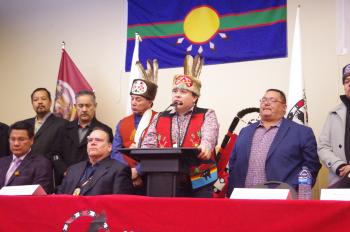Image Caption
Summary
Windspeaker.com Contributor
Thursday, Jan. 10 saw the release of the Indigenous Contributions to Manitoba report.
The report examined Indigenous contributions to the Manitoba economy, documenting the rise in employment rates and studying the success of Indigenous-owned companies, ranging from film and television production to construction, science and research collaborations.
The report results from a partnership between the Southern Chiefs’ Organization, Manitoba Keewatinowi Okimakanak and Brandon University’s Rural Development Institute.
There was nothing but pride in the room at the report’s release. Chiefs and federal government representatives presented the report at a press conference held on the Long Plains First Nation urban reserve in Winnipeg.
“The information that’s provided by your research will inform new initiatives,” said Carolyn Bennett, federal minister of Crown-Indigenous Relations.
“It represents solid evidence,” she said, demonstrating the significant contributions of Indigenous peoples to the economy and the benefits of training and opportunity for young Indigenous people in the province.
The report reveals Indigenous spending tops $9 billion through 700 Indigenous businesses, Indigenous governments, and Indigenous households. That includes infrastructure spending of governments at $420 million.
Contributions to the Manitoba GDP sits at $2.3 billion, or 3.9 per cent. Tax contributions top $230 million. The full report can be seen here https://indigenousstrong.ca/
Grand Chief Jerry Daniels of the Southern Chiefs’ Organization said diversifying the economy is the goal.
“I think I speak for many of the young people when I say we don’t always have to be a resource development economy. There are economies around the world that are innovative economies, and we can look to Japan, as an example, where they’re focused on innovation, and they’re leading in that way.
“Just because we have so many resources doesn’t mean we have to just focus on that. Many of the young people would like to encourage leaders and people who are at the forefront to focus on innovation, to focus on sustainability, because that is what is going to take us to where we need to be.”
He said the chiefs are “working on practical, tangible solutions, and we want to encourage great genuine relationships, not empty rhetoric. We want to be able to show that to people. I hope that regular Manitobans and other people who are listening understand we mean it when we say it. We mean it through our actions, and we hope that the same courtesy will be extended, and together, we can continue to prosper as people of Manitou Ahbee, as people of where the Creator is.”
In the closing prayer, Elder Eliza Beardy asked for help.
“Help us, by our example, to teach others how to deal with honesty, with one another. You have blessed our world with abundant, even lavish wealth… abolish greed. Raise up managers of your bounty, who operate with integrity, ethics, and honour.
After the official announcement, the chiefs from each community studied in the two-year report were available for questions. Grand Chief Garrison Settee from Manitoba Keewatinowi Okimakanak was asked about clean energy initiatives that may be introduced to communities.
“I think that it’s starting already. The clean energy, the geothermal, and the solar panels are already being initiated by communities such as Fisher River, and also Lac Brochet and the northern communities. There’s innovation happening, so it’s the beginning of something great.”
Minister Bennett said “I think it’s the First Nations who are leading (with alternative energy). As stewards of the land and the water, they have an interest in the alternative energy sector. I think it’s paying off.”
“We’re thinking outside the box, exploring new opportunities,” said Onekanew (Chief) Christian Sinclair of the Opaskwayak Cree Nation. He sits as a director for the National Access Cannabis Corporation, which operates 10 medical marijuana clinics across Canada.
He refers to the great success of Arctic Beverages bottling, and new opportunities on the horizon.
“We have participation with the South Korean government with the LED, state of the art artificial intelligence and technology, so they’re coming in next week to be with us to help us build upon our plan for finals on the Smart City Challenge, which we hope to be the victors in come early May 2019.
“We’re about to plan now to go into the aerospace industry and, of course, we’re key players.”
An announcement of the business plan of the joint venture between the Manitoba aerospace industry and Boeing Air, as well as other international partners, will be made later this month.

